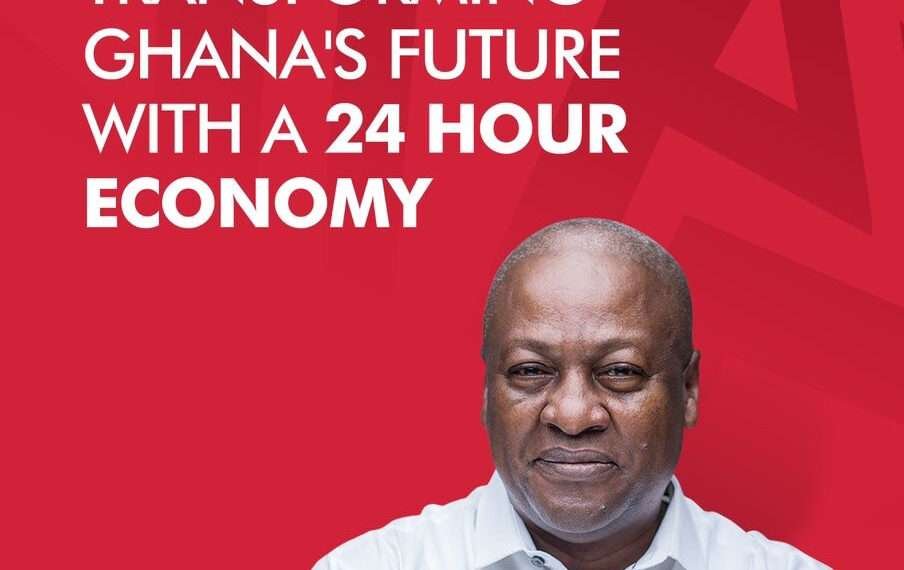A recent national opinion poll conducted by Global InfoAnalytics has shed light on the varying levels of support for key campaign slogans, policies, and promises across different demographics and regions.
The report assessed the 24-hour economy proposed by the National Democratic Congress, digitization, which is championed by the flagbearer of the New Patriotic Party, and the Great Transformational Plan proposed by the leader of the Movement for Change, and how they have been accepted by voters by age groups, educational level, and employment status.
“Today, I want to focus on the various campaign slogans, policies, or promises that we have heard so far from the campaign teams. The 24HR economy, digitization, and Great Transformational Plan and how they have been accepted by voters by age groups, educational level, and employment status”
Musa Danquah, Executive Director, Global InfoAnalytics
To begin with, the report revealed that the 24–hour economy proposed by the National Democratic Congress flagbearer, former President John Dramani Mahama received higher approval with Ghana’s younger population, with 53 percent of voters aged 18-35 expressing support for the policy.
The trend continued with a 49 percent approval rate in the 36-45 age group while interestingly, support wanes among those aged 66 and above, highlighting a generational divide in the perception of this policy.
Contrary to expectations, digitalization, which is been championed by the flagbearer of the New Patriotic Party, Vice President Dr. Mahamudu Bawumia enjoyed the highest support from voters aged 46-50 and those aged 66 and above, at 29 percent, however, it faced resistance among the younger demographic, with only 22 percent of 18-35 year-olds showing approval towards the policy.
Again, the 24-hour Economy policy found strong backing from those with 55 percent of Junior High Education backing the policy and 58 percent of people without formal education also backed the policy, while digitalization, on the other hand, resonated more with voters with 32 percent of tertiary education and 24 percent of Senior High graduates buying into the policy.
Among employment status and policy preferences, support for the 24-hour economy is most pronounced among self-employed voters, the unemployed, and those who did not disclose their employment status with 55 percent, 52 percent, and 52 percent of voters backing the policy respectively.
On the other hand, digitalization garnered the most support from government or Non-Governmental Organization employees and retirees with 38 percent and 33 percent of voters backing the policy respectively.
Regional Disparities, Unraveling Policy Preferences Across Ghana
Furthermore, the regional breakdowns revealed overwhelming support for the 24-hour economy in the Northern region , Upper West, and Volta with 75 percent, 65 percent and 63 percent of voters accordingly embracing the concept as a potential catalyst for economic growth.
On the other hand, digitalization saw the highest support in the Northeast region, followed by Bono and Savannah with 44 percent, 35 percent, and 35 percent of voters backing the policy. This suggests a regional appreciation for the benefits of technological advancement.
The Western region emerged as the epicenter of support for the Great Transformational Plan (GTP) with 13 percent, closely followed by Central with 12 percent, while Ashanti, and Bono, both tied at 11 percent.
However, Oti, Upper East, and the Eastern regions with 28 percent, 26 percent, and 25 percent of voters exhibited the highest levels of skepticism toward any of the proposed policies, signaling a need for deeper engagement and communication.
Moreover, on party affiliations and their preference towards the various policies, the New Patriotic Party-affiliated voters largely endorsed digitalization, with 59 percent of voters in support, while, 20 percent of voters rallied behind the 24-hour economy, and 9 percent of voters favored the Great Transformational Plan with 12 percent of voters surprisingly remain uncommitted to any of these policies.
On the other hand, the supporters of the National Democratic Congress overwhelmingly backed the 24-hour economy with 87 percent of voters supporting the policy with only 4 percent of voters supporting digitalization. This indicates a strong alignment with the core message of the Mahama 2024 Campaign.
More so, floating voters according to the report expressed a nuanced stance, with 41 percent supporting the 24-hour economy, 18 percent backing digitalization, and 12 percent favoring the Great Transformational Plan, with a significant 30 percent of them remained undecided or uncommitted to any policy.
The report also revealed that supporters of the Great Transformational Plan show a strategic inclination, with 66 percent intending to vote for the leader of the Movement for Change, Alan Kyerematen, while 17 percent intend to vote for John Dramani Mahama, with 8 percent of them intend to vote for the incumbent New Patriotic Party. This dynamic suggests an interesting political calculus among GTP admirers.
In addition, the poll delved into how voters aligned with specific policies express their intentions. Here among the 24-hour economy supporters, 91 percent of them intend to vote for John Dramani Mahama while 4 percent of them intend to vote for the Vice President, Dr Mahamudu Bawumia with 1 percent of voters intending to vote for Alan Kyerematen.
The comprehensive analysis of the report underscores the critical importance for political parties to craft messages that resonate with the diverse demographics, regional nuances, and party affiliations.
It is important to emphasize that understanding the electorate’s pulse is paramount as parties seek to secure voter trust and translate policy proposals into electoral victories.
In what appears to be a dynamic political landscape, strategic messaging can be the key to capturing the hearts and ballots of the Ghanaian populace in the upcoming 2024 elections.
READ ALSO: Mahama’s Campaign Denies Claims Of Over-Relying On Alan For Political Gains In Ashanti Region




















